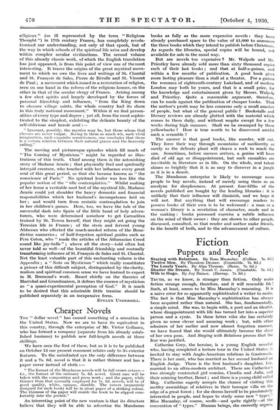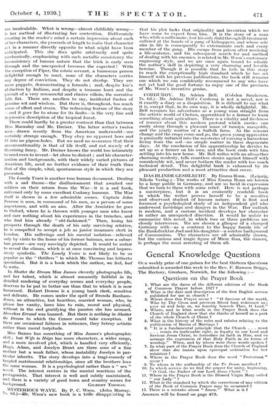Fiction
Puppets and People Taunt, as we know, is stranger than fiction. Only make fiction strange enough, therefore, and it will resemble life ! Such, at least, seems to be Miss Macaulay's reasoning. It is a naive error for so apparently sophisticated a writer to make. The fact is that Miss Macaulay's sophistication has always been acquired rather than natural. She has, fundamentally, a simple mind. She was, to begin with, a poet and an idealist, whose disappointment with life has turned her into a superior person and a cynic. In these latter ra'les she has certainly given us some clever and amusing work ; but, with other admirers of her earlier and now almost forgotten manner, we have feared that she would ultimately become the slave of her own pose. And Staying with Relations proves that the fear was justified.
Catherine Grey, the heroine, is a young English novelist who, having completed a lecture tour in the United States, is invited to stay with Anglo-American relations in Guatemala. There is her aunt, who has married as her second husband au English Judge. There is the first husband's daughter, hie, married to an ultra-modem architect. There are Catherine's two strongly contrasted girl cousins, Claudia and Julia, and their mincing brother, Benet ; and there is a young child called Meg. Catherine eagerly accepts the chance of visiting this motley assemblage of relatives in their baroque villa on the edge of a great forest ; for she deems herself to be passionately interested in people, and hopes to study some new "types. Miss Macaulay, of course, scoffs—and quite rightly—at the convention of "types." Human beings, she correctly argues,
are incalculable. What is wrong—almost childishly wrong— is her method of illustrating her contention. Deliberately creating in the reader's mind a certain impression about each cof her characters, she proceeds at length to make that character act in a manner directly opposite to what might have been anticipated. This she does quite arbitrarily and quite mechanically, emphasizing with such metallic consistency the inconsistency of human nature that the trick is early seen through and the unexpected becomes the expected ! With the exception of Piper, the estate servant, a humorous person delightful enough to meet, none of the characters carries
any degree of conviction. They do not develop. They are
mere puppets, demonstrating a formula ; and, despite Isie's abduction by Indians, and despite a treasure hunt and the pursuit of a very resourceful and elusive villain, the narrative falls flat. There are, needless to say, incidental flashes of genuine wit and wisdom. But there is, throughout, too :ouch sense of effort and strain. The redeeming feature of the story —and it goes far to atone for its faults—is the very fine and impressive description of the tropical forest.
There could hardly be a greater contrast than that between Miss Macaulay and Mr. Dreiser. The latter writer's twelve
men--drawn mostly from the American underworld—are certainly strange enough. They obey no apparent laws and fit into no pigeon-holes. But we need no atsurance that their unconventionality is that of life itzelf, and not merely of a
theorizing fancy. Mr. Dreiser knows the world too intimately to need even to invent—let alone to distort ; and his character-
ization and backgrounds, with their widely varied pictures of American life, need no further evidence of their truth than that of the simple, vital, spontaneous style in which they are presented.
The Lonely Years is another true human document. Dealing with a sad theme—the disillusionment that awaited our
soldiers on their return from the War—it is a sad book, enlivened only by some excellent Cockney humour. The War itself is shown in a few admirable scenes. Captain John Penrose is seen, in command of his men, as a person of some importance, and with an aim. After the Armistice he goes to Oxford, where he is thrown with younger men who know and care nothing about his experiences in the trenches, and who find him already "old-fashioned." Then, losing his prospects through the death of his only surviving relative, he is compelled to accept a job as junior insurance clerk in London. His sufferings and his mental isolation—relieved only by visits to the home of his former batman, now a subur- ban grocer—are very movingly depicted. It would be unfair
to reveal the climax, which is at once convincing and impres- sively symbolic. The Lonely Years is not likely to be so popular as the " thrillers " in which Mr. Thomas has hitherto specialized. But it is a book which the author, we feel, had to write.
In Shatter the Dream Miss James cleverly photographs life, and her talent, which is almost uncannily faithful in its
detailed rendering of everyday scenes and everyday people, deserves to be put to better use than that to which it is now harnessed. Robert Downs is a young bank clerk, sensitive and delicate. He comes under the spell of Brenda Banham- Jones, an attractive, but heartless, married woman, who, to please her vanity, lures him to ruin, moral and physical,
without in the end gratifying the passion she has aroused. Sleeveless Errand was banned. But there is nothing in Shatter the Dream to which the Censor could take exception. If there are occasional failures in reticence, they betray artistic rather than moral turpitude.
Miss Baines has something of Miss James's photographic skill ; but Wife to Hugo has more characters, a wider range,
and a more involved plot, which is handled very efficiently. Hugo, Adam, and Jocelyn Brent are three sons of a fine mother but a weak father, whose instability Jocelyn in par-
ticular inherits. The story develops into a tragi-comedy of tangled matrimonial relationships, since all the brothers love the same woman. It is a psychological rather than a " sex" novel. The interest centres in the mental reactions of the Protagonists. That interest is well and subtly maintained, and there is a variety of good town and country scenes for





















































 Previous page
Previous page